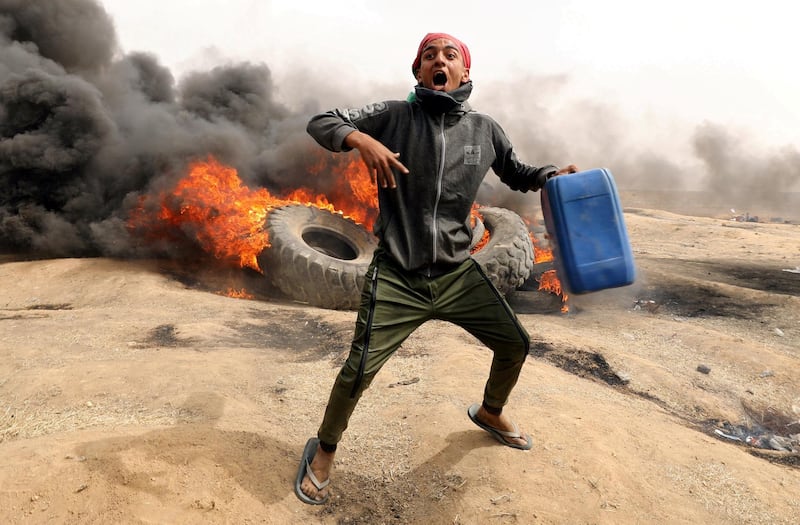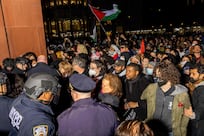Israel is refusing a Gaza man seriously wounded by sniper fire during recent border protests access to medical treatment in the West Bank, necessary to save his leg from amputation, the Gaza-based Palestinian Authority health official responsible for coordination with Israel told The National on Wednesday.
Hisham Shaath, 25, from the southern Gaza city of Khan Yunis, has been hospitalised at the European hospital there since he was shot in the right thigh on April 15. He is the latest Gazan to have participated in the protests to be denied by Israel transfer for treatment in the West Bank as part of an openly declared punitive policy against the demonstrations, which began on March 30.
The demonstrations, called to protest Israel’s blockade of Gaza and underscore the desire of refugees and their descendants to return to former homes in what became Israel, prompted criticism of the Jewish state for excessive, and at times, lethal force against demonstrators, some of whom threw stones or petrol bombs.
Mr Shaath said from his hospital bed Wednesday that he had thrown stones in the direction of troops.
Rifat Muheisin, director of coordination in Gaza for the Palestinian Authority ministry of health, said that doctors at the European Hospital determined that in order to save Shaath’s leg, he should be treated at Al Istishari Hospital in Ramallah.
On Sunday, his family submitted a request for him to cross through the Erez border crossing into Israel en route to the West Bank, but the request was rejected, said Abdul Sitar Shaath, Hisham’s father. Hisham’s condition was so bad that he could not have been moved earlier, his father said.
“There will be inflammation, gangrene and his leg will be amputated” if he is not treated in Ramallah, his father warned. “The bullet penetrated his right thigh, cut veins and arteries and smashed bones.” Mr Muheisin added that the wounds were serious: “He is in danger of losing his leg.”
The West Bank has more advanced facilities than the rudimentary care available in the impoverished coastal enclave.
Hisham, who finished only sixth grade in school, said: “I was shot when I was on a hill throwing stones in an area called Jatar, when I was 300 metres from the fence. I am in the hospital now and there is no treatment, no medication, nothing. They don’t even have a sack for urination. My father had to buy it from the pharmacy. Yesterday I had a headache and asked for a tablet. They don’t have it. My father bought it from the pharmacy.”
“Perhaps they are punishing me because I was involved in stone-throwing. If I had a job to do I would not go there and throw stones. I throw stones out of boredom. I have nothing to do in my life. I look for a job every day but without any success. I hope the Israelis will let me go to Ramallah. Otherwise, my leg will be amputated.”
34 Palestinians have been shot dead during the protests and more than 1,500 have been wounded by live fire, according to the Gaza health ministry. Israel says the Palestinians are inflating the number of wounded. No Israeli soldiers have been wounded. It says that the force if necessary to prevent penetration of its border.
But military administrators and the hard-right defence minister Avigdor Lieberman seem no more compassionate than the snipers.
“The Israeli policy decision is that with wounds that aren’t life-threatening, there is no permission to leave Gaza,” said Ran Yaron, spokesman for Physicians for Human Rights-Israel (PHR). In one case that reached the supreme court, justices overturned the military’s refusal and ordering a wounded Palestinian be allowed to pass to the West Bank.
Since then, whenever PHR has petitioned the court, the army has relented. But whoever does not have a case filed in their name, remains shut out of the care they need.
“The problem with the court petitions is that they take time and there is a delay,” Mr Yaron said. “These delays can be for hours and can make the difference between saving a limb and amputation.”
Last week, Abdul Rahman Nofal, an 11-year-old Gazan shot by a sniper, had his left leg amputated after his arrival at a Ramallah hospital was delayed by the need for PHR to mount a court challenge to Israel’s refusal to allow him to be transferred.
Mr Muheisin said that out of 24 requests submitted to the Israeli authorities for those wounded in protests to be transferred to the West Bank, only nine have been authorised. The rest were refused or are still being processed.
“The Israelis refer to security reasons, without giving any further explanation. For most of these people there is a danger of losing part of the body, the leg or the hand and sometimes there are wounds in the abdomen and it’s a lifesaving issue,” he said.
Israel’s Coordinator of Government Activities in the Territories (COGAT) said in response to a query about the Shaath case that “the state of Israel is a sovereign state with the right to decide who will enter its gates. Foreign residents have no vested right to enter Israeli territory, including Palestinians living in the Gaza Strip.
“Therefore, according to the instructions of the COGAT and the commander of the southern command, it was decided that any request for medical treatment by a terrorist or a rioter who took part in violent events would be denied. However, exceptional humanitarian cases are examined on the basis of an assessment of the security situation and at the discretion of the commander in the area.”





